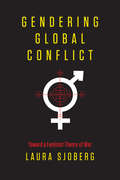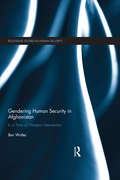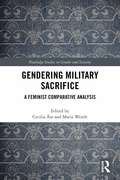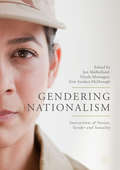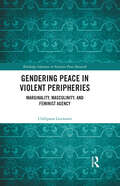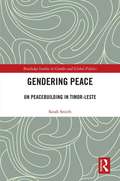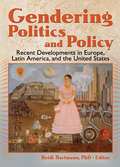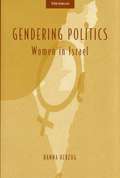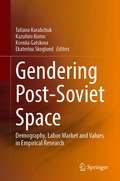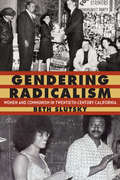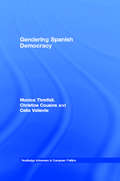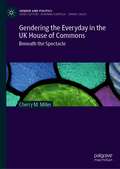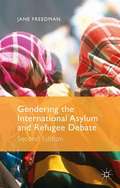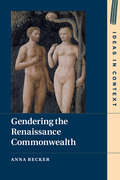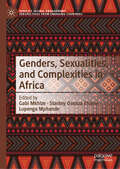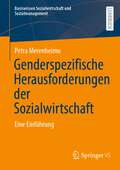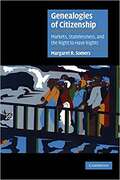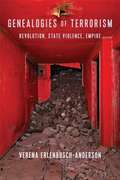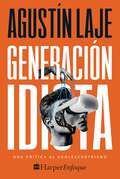- Table View
- List View
Gendering Global Conflict
by Laura SjobergLaura Sjoberg positions gender and gender subordination as key factors in the making and fighting of global conflict. Through the lens ofgender, she examines the meaning, causes, practices, and experiences of war, building a more inclusive approach to the analysis of violent conflict between states.Considering war at the international, state, substate, and individual levels, Sjoberg's feminist perspective gives a number of causal variables significant standing in war decision-making. These include structural gender inequality, cycles of gendered violence, state masculine posturing, the often overlooked role of emotion in political interactions, gendered understandings of power, and states' mistaken perception of their own autonomy and unitary nature. Gendering Global Conflict also calls attention to understudied spaces that can be sites of war, such as the workplace, the household, and even the bedroom. Her findings show gender to be a linchpin of even the most tedious and seemingly bland tactical and logistical decisions in violent conflict. Armed with that information, Sjoberg undertakes the task of redefining and reintroducing both traditional and critical readings of war's political, economic, and humanitarian dimensions, developing the beginnings of a feminist theory of war.
Gendering Global Conflict: Toward a Feminist Theory of War (Gender And Global Politics Ser.)
by Laura SjobergLaura Sjoberg positions gender and gender subordination as key factors in the making and fighting of global conflict. Through the lens ofgender, she examines the meaning, causes, practices, and experiences of war, building a more inclusive approach to the analysis of violent conflict between states.Considering war at the international, state, substate, and individual levels, Sjoberg's feminist perspective elevates a number of causal variables in war decision-making. These include structural gender inequality, cycles of gendered violence, state masculine posturing, the often overlooked role of emotion in political interactions, gendered understandings of power, and states' mistaken perception of their own autonomy and unitary nature. Gendering Global Conflict also calls attention to understudied spaces that can be sites of war, such as the workplace, the household, and even the bedroom. Her findings show gender to be a linchpin of even the most tedious and seemingly bland tactical and logistical decisions in violent conflict. Armed with that information, Sjoberg undertakes the task of redefining and reintroducing critical readings of war's political, economic, and humanitarian dimensions, developing the beginnings of a feminist theory of war.
Gendering Human Security in Afghanistan: In a Time of Western Intervention (Routledge Studies in Human Security)
by Ben WalterThis book employs the concept of human security to show what the term means from the perspective of women in Afghanistan. It engages with a well-established debate in academic and policy-making contexts regarding the utility of human security as a framework for understanding and redressing conflict. The book argues that this concept allows the possibility of articulating the substantive experiences of violence and marginalisation experienced by people in local settings as well as their own struggles towards a secure and happy life. In this regard, it goes a long way to making sense of the complex dynamics of conflict which have confounded Western policy-makers in their ongoing state-building mission in Afghanistan. However, despite this inherent potential, the idea of human security still needs refinement. Crucially, it has benefitted from critical feminist and critical social theories which provide the conceptual and methodological depth necessary to apprehend what a progressive ethical program of security looks like and how it can be furthered. Using this framework, the work provides a critical reconstruction of the effect of the US-led Western Intervention on women’s experiences of (in)security in the three provincial contexts of Nangarhar, Bamiyan and Kabul. This reconstruction is drawn from a wealth of historical and contemporary sociological research alongside original fieldwork undertaken in Delhi, India, during 2011 with women and men from the country’s different communities. This book will be of much interest to students of human security, state-building, gender politics, war and conflict studies and IR in general.
Gendering Legislative Behavior
by Tiffany D. BarnesIn democracies, power is obtained via competition. Yet, as women gain access to parliaments in record numbers, worldwide collaboration appears to be on the rise. This is puzzling: why, if politicians can secure power through competition, would we observe collaboration in Congress? Using evidence from 200 interviews with politicians from Argentina and a novel dataset from 23 Argentine legislative chambers over an 18-year period, Gendering Legislative Behavior reexamines traditional notions of competitive democracy by evaluating patterns of collaboration among legislators. Although only the majority can secure power via competition, all legislators - particularly those who do not have power - can influence the policy-making process through collaboration. Tiffany D. Barnes argues that as women have limited access to formal and informal political power, they collaborate more than men to influence policy-making. Despite the benefits of collaboration, patterns of collaboration vary among women because different legislative contexts either facilitate or constrain women's collaboration.
Gendering Military Sacrifice: A Feminist Comparative Analysis (Routledge Studies in Gender and Security)
by Cecilia Åse Maria WendtThis book offers a feminist analysis of military sacrifice and reveals the importance of a gender perspective in understanding the idea of honourable death. In present-day security discourses, traditional masculinised obligations to die for the homeland and its women and children are challenged and renegotiated. Working from a critical feminist perspective, this book examines the political and societal justifications for sacrifice in wars motivated by human rights and an international responsibility to protect. With original empirical research from six European countries, the volume demonstrates how gendered and nationalistic representations saturate contemporary notions of sacrifice and legitimate military violence. A key argument is that a gender perspective is necessary in order to understand, and to oppose, the idea of the honourable military death. Bringing together a wide range of materials – including public debates, rituals, monuments and artwork – to analyse the justifications for soldiers’ deaths in the Afghanistan war (2002–14), the analysis challenges methodological nationalism. The authors develop a feminist comparative methodology and engage in cross-country and transdisciplinary analysis. This innovative approach generates new understandings of the ways in which both the idealisation and the political contestation of military violence depend on gendered national narratives. This book will be of much interest to students of gender studies, critical military studies, security studies and International Relations.
Gendering Nationalism: Intersections Of Nation, Gender And Sexuality
by Nicola Montagna Jon Mulholland Erin Sanders-McDonaghThis volume offers an empirically rich, theoretically informed study of the shifting intersections of nation/alism, gender and sexuality. Challenging a scholarly legacy that has overly focused on the masculinist character of nationalism, it pays particular attention to the people and issues less commonly considered in the context of nationalist projects, namely women and sexual minorities. Bringing together both established and emerging researchers from across the globe, this multidisciplinary and comparison-rich volume provides a multi-sited exploration of the shifting contours of belonging and Otherness generated by multifarious nationalisms. The diverse, and context specific positionings of men and women, masculinities and femininities, and hegemonic and non-normative sexualities, vis-à-vis nation/alism, are illuminated through a vibrant array of contemporary theoretical lenses. These include historical and feminist institutionalism, post-colonial theory, critical race approaches, transnational and migration theory and semiotics.
Gendering Peace in Violent Peripheries: Marginality, Masculinity, and Feminist Agency (Routledge Advances in Feminist Peace Research)
by Uddipana GoswamiThis book forwards Assam (and Northeast India) as a specific location for studying operations of gendered power in multi-ethnic, conflict-habituated geopolitical peripheries globally. In the shifting and relational margins of such peripheral societies, power and agency are constantly negotiated and in flux. Notions of masculinity are redefined in an interlaced environment of militarization, hyper-masculinization, and gendered violence. These interconnections inform victimhood and agency among the most vulnerable marginalized constituencies – namely, women and migrants. By centering the marginalized in its inquiry, the book analyzes obstacles to achieving positive, organic peace based on cooperation and mutual healing. The tools used to perpetuate an endless cycle of violence that makes conflict a habit – a way of life – are identified in order to enable resistance against them from within the margins. Such resistance must be based on reflexivity and strategic, cautious radicalism. This involves critically interrogating the inherent connections between engendered pasts and feminist futures, local changes and global contexts, as well as between small, incremental changes and big shifts impacting entire societies, nations, and global orders. This book will be of much interest to students of ethnic conflict, conflict resolution, feminist peace, and Asian/South Asian politics.
Gendering Peace: UN Peacebuilding in Timor-Leste (Routledge Studies in Gender and Global Politics)
by Sarah SmithIn 1999, after 24-years of violent military occupation by Indonesian forces, the small country of Timor-Leste became host to one of the largest UN peace operations. The operation rested on a liberal paradigm of statehood, including nascent ideas on gender in peacebuilding processes. This book provides a critical feminist examination of the form and function of a gendered peace in Timor-Leste. Drawing on policy documents and field research in Timor-Leste with national organisations, international agencies and UN staff, the book examines gender policy with a feminist lens, exploring and developing a more complex account of ‘gender’ and ‘women’ in peace operations. It argues that gendered ideologies and power delimit the possibilities of building a gender-just peace, and contributes deep insight into how gendered logics inform peacebuilding processes, and specifically how these play out through the implementation of policy that explicitly seeks to reorder gender relations at sites in which peace operations deploy. By utilising a single case study, the book provides space to examine both international and national discourses, and contextualises its analysis of Women, Peace and Security within local histories and contexts. This book will be of interested to scholars and students of gender studies, global governance, International Relations, and security studies.
Gendering Politics and Policy: Recent Developments in Europe, Latin America, and the United States
by Heidi I. HartmannTop feminist theorists and scholars examine the latest developments in gender politics and policy around the worldGendering Politics and Policy: Recent Developments in Europe, Latin America, and the United States discusses in depth how women and women&’s perspectives are changing politics and policy in both the United States and around the world. This compelling resource surveys a range of issues and methodologies to bring the most recent gender issues, politics, and policies into clear focus. Top feminist scholars and theorists from several disciplines explore the latest in gender mainstreaming, gender budgeting, citizenship, social capital, and the gender gap in various cultures and countries.Gendering Politics and Policy provides case studies of different policy areas, techniques, and political practice as it highlights issues important for women and women&’s issues around the world. The book&’s three main sections include detailed looks at politics and gender issues in the United States, policies of concern for women in Latin America and Europe, and women&’s agendas in the United Nations. This book is extremely useful as a teaching tool for students by surveying a wide range of vital issues and methodologies of gender development, women and politics, women and public policy, and women in international politics. The text is extensively referenced and includes several tables and figures to clearly present data and ideas.Gendering Politics and Policy discusses: the need for women&’s citizenship-a new form of gendered citizenship more inclusive of women&’s issues that strengthens democratic governability gender politics in presidential elections-including the impact the attention to women&’s votes has had on public policies of administrations between elections the relationships between women&’s status and social capital attack campaigning of male candidates against women candidates the gender implications of economic policy in the United Kingdom the discretionary nature of funding for support of domestic violence laws in Latin America, Central America, and the Caribbean region women&’s increased leadership roles in German government the need for gender mainstreaming in the German economy child care as an international human right the involvement of women&’s nongovernmental organizations at UN conferencesGendering Politics and Policy is illuminating reading for educators, advanced undergraduate and graduate students in women&’s studies, political science, and public policy, as well as policy researchers and women leaders around the world.
Gendering Politics: Women in Israel
by Hanna HerzogWhat are the cultural and structural mechanisms that exclude women from politics in general and from local politics in particular? What meaning is ascribed to women's political activity? Gendering Politics explores the place of women in democratic politics by means of a detailed study of women in Israeli politics who were elected to municipal councils from 1950 to 1989. Drawing from a variety of sources, including questionnaires, interviews, newspaper coverage, and existing statistical data, as well as examinations of studies of the role of women in politics in other democracies, Herzog analyzes the extent of success and failure of women in Israeli elections. She then explores reasons why female participation in Israeli politics has been relatively slight, despite historical precedents and social circumstances that would indicate otherwise. The author examines the gendered bias of the power structure as it is shaped by basic cultural organizing principles. She exposes hidden assumptions--and notes the overt assumptions--which by definition exclude women from politics. The author also looks at the structure of opportunities within the prevailing political system, uncovering the relevant blocking and facilitating elements.
Gendering Post-Soviet Space: Demography, Labor Market and Values in Empirical Research
by Tatiana Karabchuk Kazuhiro Kumo Kseniia Gatskova Ekaterina SkoglundThis volume combines approaches from three disciplines – economics, sociology, and demography – and empirically analyzes the key aspects of the labor market and social demography processes in post-Soviet transitional societies while focusing on the gender perspective. Here, readers will find empirical studies on such countries as Armenia, Azerbaijan, Belarus, Estonia, Georgia, Kazakhstan, Kyrgyzstan, Russia, Tajikistan, Ukraine, and Uzbekistan. The volume contributes to the literature by addressing the lack of academic empirical research on gender difference issues in the labor markets of post-Soviet countries as well as gender inequalities in fertility preferences, gender disparities among the youth and elderly, the gender pay gap, gender differences in employment, and female voices. The book brings together researchers of different disciplines from a variety of countries, distinguishing this project as international and interdisciplinary. The authors use the quantitative survey micro-data approach as well as the qualitative methods of interview data analysis to provide a comprehensive and detailed overview of the economic and social developments in the region regarding gender differences. The volume consists of three parts tackling the following topics: 1) gender differences and demography (family formation and fertility, youth and elderly employment); 2) gender differences and labor market (gender wage gap, motherhood wage penalty, gender differences among freelancers, and women in STEM science); and 3) gender differences, well-being, and gender equality attitudes (women’s voices, women’s collective actions, gender equality attitudes, and spending patterns of housewives).
Gendering Radicalism: Women and Communism in Twentieth-Century California (Women in the West)
by Beth SlutskyIn 1919 Charlotte Anita Whitney, a wealthy white woman, received one of the first Communist Labor Party membership cards for the charter group of the northern California Communist Labor Party. Less than a decade later in Berkeley, California, a Jewish woman named Dorothy Ray Healey became a card-carrying member of the Young Communist League. Nearly forty years later, in 1966, Kendra Claire Harris Alexander, a mixed-race woman, enlisted with the Los Angeles branch of the Communist Party, determined to promote class equality. In Gendering Radicalism, Beth Slutsky examines how American leftist radicalism was experienced through the lives of these three women who led the California branches of the Communist Party from its founding in 1919 to its near dissolution in 1992. Separately, each woman represents a generation of the membership and activism of the party. Collectively, Slutsky argues, their individual histories tell the story of one of the most infamous organizations this country has ever known and in a broader sense represent the story of all women who have devoted their lives to radicalism in America. Slutsky considers how gender politics, California’s political climate, coalitions with other activist groups and local communities, and generational dynamics created a grassroots Communist movement distinct from the Communist parties in the Soviet Union and Europe. An ambitious comparative study, Gendering Radicalism demonstrates the continuity and changes of the party both within and among three generations of its female leaders’ lives.
Gendering Spanish Democracy (Routledge Advances in European Politics #Vol. 20)
by Monica Threlfall Christine Cousins Celia ValienteThis book provides an up-to-date critical assessment of gender in Spain with reference to the key social and political fields. It addresses aspects of women's experience such as the public spheres of elective politics, public policy-making and the labour market. This is underpinned by an in-depth analysis of underlying dynamics and structures that contribute to shaping gender relations in Spain, including women's activism, the family and the state social security system.
Gendering the Everyday in the UK House of Commons: Beneath the Spectacle (Gender and Politics)
by Cherry M. MillerThis book explores the reproduction of gender ‘beneath the spectacle’ – that is, beneath ceremonial displays of power, in the UK House of Commons. Contributing to a fascinating literature on gender and parliaments, the book conceives of the House of Commons as a workplace, as well as a representative arena. It explores the everyday consequences for gendered power relations that this unique environment entails, as parliamentary actors perform their careers, citizenship, and public service. The book firstly explores ways to conceive of and to study gender in parliaments. Parliamentary ethnography – that is, spending time observing and engaging with parliamentary actors, is presented as an unparalleled methodology to better understand gender, power, and agency. The chapters that follow provide in-depth portrayals of gender and the parliamentary workplace. The book connects multiple actors in the House of Commons: MPs, officials, parliamentary researchers, and the (in)formal rules that structure the relationships between them.
Gendering the International Asylum and Refugee Debate
by Jane FreedmanThis study provides a comprehensive account of the situation of women refugees globally and explains how they differ from men. It looks at causes of refugee flows, international laws and conventions and their application, the policies and legislation of Western governments, and lived experiences of the refugees themselves.
Gendering the Renaissance Commonwealth (Ideas in Context #123)
by Anna K. BeckerThis pioneering and innovative study challenges modern assumptions of what constitutes the political and the public in Renaissance thought. Offering gendered readings of a wide array of fifteenth- and sixteenth-century political thinkers, with a particular focus on the two prime thinkers of the early modern state, Niccolò Machiavelli and Jean Bodin, Anna K. Becker reconstructs a neglected but important classical tradition in political thought. Exploring how 'the political' was incorporated into a wide array of 'private' or 'apolitical' topics by early modern thinkers, Becker demonstrates how both republican and absolutist thinkers - the two poles which organise early modern political thought - relied on gendered justifications. In doing so, she reveals how the foundations of the modern state were significantly shaped by gendered concerns.
Genders, Sexualities, and Complexities in Africa (Africa's Global Engagement: Perspectives from Emerging Countries)
by Stanley Osezua Ehiane Gabi Mkhize Lupenga MphandeThis book’s significance is in its African-centred border crossing overt and covert forces working against genders and sexualities, reinforcing endemic gender and sexual based complexities. Pragmatically, sexualities and genders in Africa remain contested and an area of power and control contestations in both the private and public spheres. Gender based violence and femicide (GBVF), in particular, continue to escalate, particularly during the COVID-19 pandemic. Such GBVF, at most, affects young women, migrants, LGBTIQIA+ people, sex workers, informal street traders, and widows, amongst others. This is happening at a time when the feminist and women’s movements in Africa are experiencing fragmentations and factions that pull and push organising to the margins of prejudice internally, thereby exacerbating an act of ‘subordinated inclusion’. In this context, the term ‘subordinated inclusion’ connotes another form of complexity where the ‘subaltern’ has been brought inside a room as an act of inclusion yet systemically subordinated through structure and obedience, thereby compromising agency. This complexity occurs in private and public domains, where a continuum of contestations between structure and agency is sustained. Consequently, power struggles emerge and proliferate unabated into gendered and sexualised complexities, including relations of state, coloniality, apartheid, prejudice, marginalization, capitalism and democracy. This book thus strives to surface these contestations and complexities and how they continue to thrive in an era that seeks another way possible, a way out, a jump off, a manner of dealing and an exit from the status quo.
Genderspezifische Herausforderungen der Sozialwirtschaft: Eine Einführung (Basiswissen Sozialwirtschaft und Sozialmanagement)
by Petra MerenheimoGeschlecht wird in den wissenschaftlichen Studien häufig als eine unabhängige Kategorie behandelt. Dadurch kann z.B. die Geschlechterverteilung in den Leitungspositionen der sozialen Organisationen sichtbar gemacht werden. Es existiert aber eine Vielfalt von geschlechterspezifischen Perspektiven und Methoden, die eine kritische Analyse der Sozialwirtschaft ermöglichen. In diesem Buch werden die allgemein anerkannten entscheidungstheoretischen Grundannahmen wie die der Rationalität und Reflexivität aus der Geschlechterperspektiven betrachtet und aktuelle Konzepte wie das der Nachhaltigkeit um die Geschlechterperspektive erweitert.
Gene Wars: The Politics of Biotechnology (Open Media Series)
by Kristin DawkinsDespite technological advances, an alarming number of people in the world go hungry. Even more chilling is the fact that in the future that number will likely increase. In this book, Kristin Dawkins discusses the international policies that are shaping this future, including those that govern the genetic engineering of plants. Dawkins shows how a diversified gene pool is crucial to food production - and how corporate control of the gene pool threatens our collective security.Behind these issues lies the specter of globalization - transnational corporations freely exploiting the resources and consumers of the world while political power shifts to remote international institutions strictly dedicated to commerce. Dawkins challenges those in power to develop global systems of political discourse in the public interest and shows how each one of us can make a difference.
Genealogies of Citizenship: Markets, Statelessness, and the Right to Have Rights (Cambridge Cultural Social Studies)
by Margaret R. SomersGenealogies of Citizenship is a remarkable rethinking of human rights and social justice. As global governance is increasingly driven by market fundamentalism, growing numbers of citizens have become socially excluded and internally stateless. <p><p> Against this movement to organize society exclusively by market principles, Margaret Somers argues that socially inclusive democratic rights must be counter-balanced by the powers of a social state, a robust public sphere and a relationally-sturdy civil society. Through epistemologies of history and naturalism, contested narratives of social capital, and Hurricane Katrina's racial apartheid, she warns that the growing authority of the market is distorting the non-contractualism of citizenship; rights, inclusion and moral worth are increasingly dependent on contractual market value. <p><p> In this pathbreaking work, Somers advances an innovative view of rights as public goods rooted in an alliance of public power, political membership, and social practices of equal moral recognition - the right to have rights.
Genealogies of Terrorism: Revolution, State Violence, Empire (New Directions in Critical Theory #66)
by Verena Erlenbusch-AndersonWhat is terrorism? What ought we to do about it? And why is it wrong? We think we have clear answers to these questions. But acts of violence, like U.S. drone strikes that indiscriminately kill civilians, and mass shootings that become terrorist attacks when suspects are identified as Muslim, suggest that definitions of terrorism are always contested. In Genealogies of Terrorism, Verena Erlenbusch-Anderson rejects attempts to define what terrorism is in favor of a historico-philosophical investigation into the conditions under which uses of this contested term become meaningful. The result is a powerful critique of the power relations that shape how we understand and theorize political violence.Tracing discourses and practices of terrorism from the French Revolution to late imperial Russia, colonized Algeria, and the post-9/11 United States, Erlenbusch-Anderson examines what we do when we name something terrorism. She offers an important corrective to attempts to develop universal definitions that assure semantic consistency and provide normative certainty, showing that terrorism means many different things and serves a wide range of political purposes. In the tradition of Michel Foucault’s genealogies, Erlenbusch-Anderson excavates the history of conceptual and practical uses of terrorism and maps the historically contingent political and material conditions that shape their emergence. She analyzes the power relations that make different modes of understanding terrorism possible and reveals their complicity in justifying the exercise of sovereign power in the name of defending the nation, class, or humanity against the terrorist enemy. Offering an engaged critique of terrorism and the mechanisms of social and political exclusion that it enables, Genealogies of Terrorism is an empirically grounded and philosophically rigorous critical history with important political implications.
Generación idiota: Una crítica al adolescentrismo
by Agustin LajeGeneración idiota nos ofrece una inmersión profunda en la desaparición de la sociedad intergeneracional y el auge de la mentalidad adolescente, que ha causado un gran daño a la política y a la sociedad.En la continuación de su best seller internacional La batalla cultural, el afamado escritor, politólogo y conferencista Agustín Laje presenta Generación idiota: Una crítica al adolescentecentrismo. Según Agustín, las ideologías centradas en la adolescencia del siglo XXI están en auge. Como resultado, los adolescentes están gobernando el mundo. Rigen la forma de la cultura, estructuran la forma de la política, inspiran los cambios de nuestro lenguaje, imponen sus preferencias estéticas y dominan el imaginario postindustrial y el sistema de consumo. Las instituciones básicas, como la familia, también están fuera de lugar en estas generaciones adolescentes.El libro está dividido en cinco capítulosCapítulo 1 – Una investigación sobre el papel y el poder de los ancianos a lo largo de la historia y su caída con el advenimiento de las sociedades modernasCapítulo 2 – La caracterización y explicación de la "sociedad adolescente", el idiota posmoderno, y el gran tema de la identidad que está omnipresente y arraigado en nuestra sociedadCapítulo 3 – El papel de la moda, el entretenimiento y la tecnología digital y cómo han afectado y moldeado la cultura y la política del siglo XXICapítulo 4 – La expropiación del poder de la familia en la sociedad, la omnipresencia del adoctrinamiento en la educación y el devastador poder socializador de los medios de comunicación de masasCapítulo 5 – Agustín cierra ofreciendo un modelo de rebelión muy diferente para la Nueva Derecha (a la que vuelve a expresar su apoyo), cómo escapar de la idiotez política, y rebelarse de verdad contra el sistema establecido.Si estás cansado del adoctrinamiento más descarado de los medios de comunicación, las escuelas, las universidades y, sobre todo, de nuestros hijos, querrás leer Generación idiota, en la que Laje ofrece un modelo particular de rebelión para la Nueva Derecha. Escapemos juntos el idiotismo político y rebelarnos contra el sistema establecido. ¡Manos a la obra!Idiot GenerationIdiot Generation offers a deep dive into the demise of the transgenerational society and the rise of the adolescent mentality, which has caused great damage to politics and society.In the follow-up to his international bestseller The Culture Battle, famed writer, political scientist, and lecturer Agustín Laje presents Idiot Generation: A Critique of Adolescentcentrism.According to Agustin, adolescent-centered ideologies of the 21st century are rampant. As a result, adolescents are ruling the world. They govern the shape of culture, structure the shape of politics, inspire the changes in our language, impose their aesthetic preferences, and dominate post-industrial imagery and the consumer system. Basic institutions, such as the family, are also out of place in these adolescent generations.
General Aviation Security: Aircraft, Hangars, Fixed-Base Operations, Flight Schools, and Airports
by Ph.D, Daniel BennyAfter 9/11, the initial focus from the U.S. government, media, and the public was on security at commercial airports and aboard commercial airlines. Soon, investigation revealed the hijackers had trained at flight schools operating out of general aviation airports, leading to a huge outcry by the media and within the government to mandate security
General Energy System: Sector Coupling through Electricity and Hydrogen (essentials)
by Zbigniew A. Styczynski Przemyslaw Komarnicki Michael KranholdThis essential provides a compact overview of the genesis and the implementation steps taken so far in the energy transition and describes in particular the framework conditions of the changing energy system. Thus, the book is excellently suited as an introductory read into the subject of the energy transition, which will also lead to the creation of a holistic total energy system.
General George Washington: A Military Life
by Edward G. LengelMuch has been written in the past two centuries about George Washington the statesman and “father of his country.” Less often discussed is Washington’s military career, including his exploits as a young officer and his performance as the Revolutionary War commander in chief. Now, in a revealing work of historical biography, Edward Lengel has written the definitive account of George Washington the soldier.Based largely on Washington’s personal papers, this engrossing book paints a vivid, factual portrait of a man to whom lore and legend so tenaciously cling. To Lengel, Washington was the imperfect commander. Washington possessed no great tactical ingenuity, and his acknowledged “brilliance in retreat” only demonstrates the role luck plays in the fortunes of all great men. He was not an enlisted man’s leader; he made a point of never mingling with his troops. He was not an especially creative military thinker; he fought largely by the book. He was not a professional, but a citizen soldier, who, at a time when warfare demanded that armies maneuver efficiently in precise formation, had little practical training handling men in combat. Yet despite his flaws, Washington was a remarkable figure, a true man of the moment, a leader who possessed a clear strategic, national, and continental vision, and who inspired complete loyalty from his fellow revolutionaries, officers, and enlisted men. America could never have won freedom without him.A trained surveyor, Washington mastered topography and used his superior knowledge of battlegrounds to maximum effect. He appreciated the importance of good allies in times of crisis, and understood well the benefits of coordination of ground and naval forces. Like the American nation itself, he was a whole that was greater than the sum of its parts–a remarkable everyman whose acts determined the course of history. Lengel argues that Washington’s excellence was in his completeness, in how he united the military, political, and personal skills necessary to lead a nation in war and peace. At once informative and engaging, and filled with some eye-opening revelations about Washington, the war for American independence, and the very nature of military command, General George Washington is a book that reintroduces readers to a figure many think they already know.
